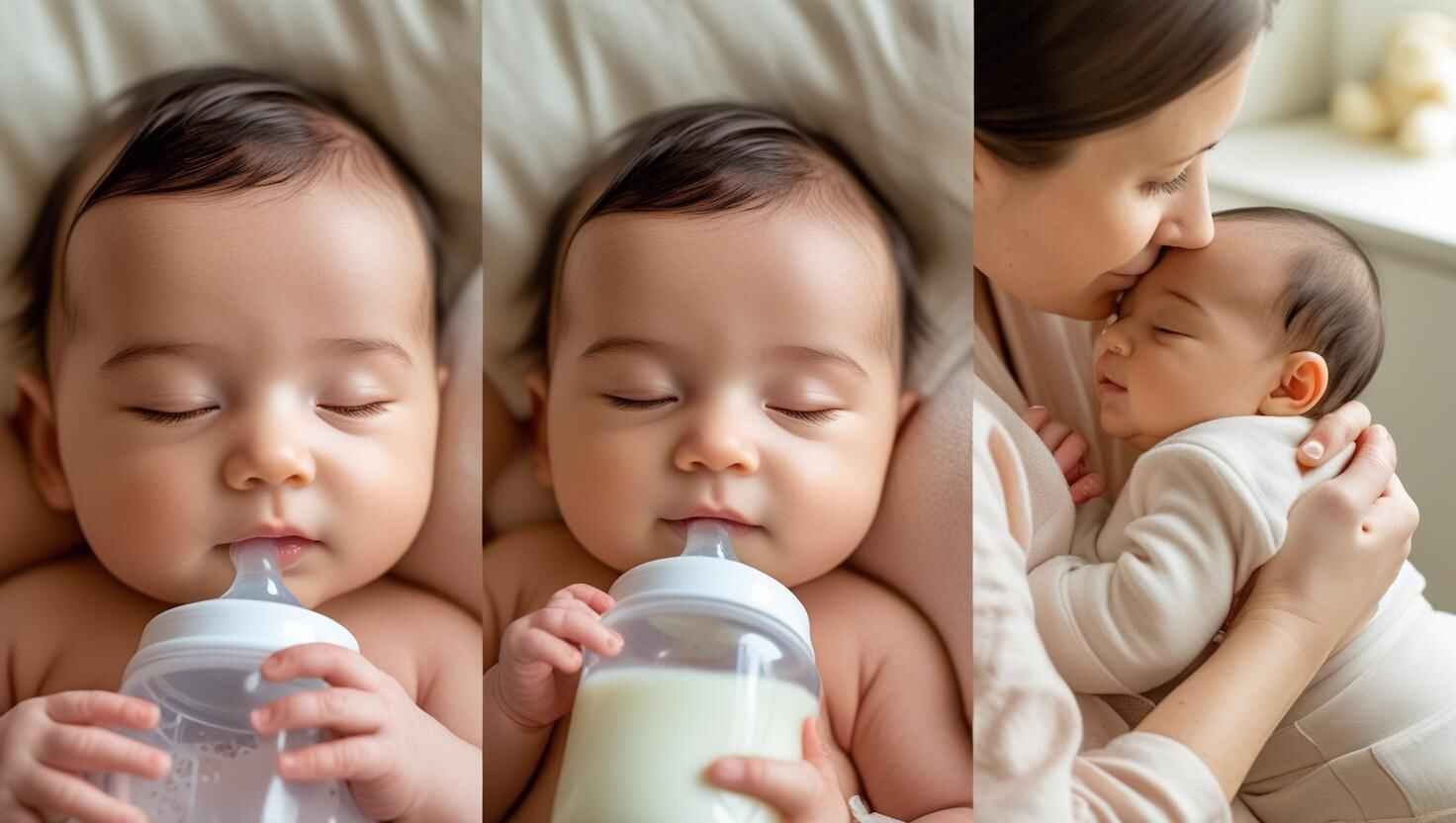Feeding a baby with a tongue-tie or lip-tie can be one of the most emotional and frustrating experiences for new parents. Babies with these oral restrictions often struggle with latching, milk transfer, and excess air intake—leading to long feeding sessions, gas, fussiness, and poor weight gain.
The right bottle can make all the difference.
In this article, we’ll walk you through the best bottles for babies with tongue and lip ties, what to look for when choosing one, and how the right features can support more effective and comfortable feeding. Whether you’re bottle-feeding full time, supplementing, or transitioning from breast to bottle, these options have been carefully selected for their ability to ease latch issues and reduce colic symptoms.
Best 5 Bottles for Babies with Tongue and Lip Ties
Best for Breastfed Babies with Latch Issues: Comotomo Baby Bottles
Best Anti-Colic Bottle for Tongue-Tied Infants:Dr. Brown’s Natural Anti-Colic Bottles
Best for Reducing Reflux and Gulping: Philips Avent Natural Bottle AirFree
Best Clinically-Informed Design: Evenflo Feeding Balance+ Bottles
Best for Sensitive Stomachs and Fuss-Free Cleaning: MAM Easy Start Anti-Colic Bottles
| Brand & Model | Key Features | Material | Available Sizes | Slow Flow Nipple | Benefits for Tongue-Tied Babies |
|---|---|---|---|---|---|
| Dr. Brown’s Natural Flow Options+ | Internal vent system, anti-colic, narrow neck | BPA-Free Plastic or Glass | 4 oz, 8 oz | Yes (Level 1 Nipple) | Reduces gas and reflux; helps babies with weak latch maintain suction |
| Comotomo Baby Bottle | Soft silicone body, wide breast-like nipple, dual vents | Silicone | 5 oz, 8 oz | Yes (Slow Flow for 0–3 months) | Encourages natural latch; flexible body lets parents assist flow gently |
| Philips Avent Natural Bottle | Wide nipple, anti-colic valve, ergonomic shape | Plastic (BPA-Free), Glass | 4 oz, 9 oz, 11 oz | Yes (Newborn Flow Nipple) | Ideal for switching between breast and bottle; reduces nipple confusion |
| MAM Easy Start Anti-Colic Bottle | Self-sterilizing, flat soft nipple, vented base | Plastic (BPA-Free) | 5 oz, 9 oz, 11 oz | Yes (Size 0 or 1) | Flat nipple promotes easier latch for tongue/lip-tied babies |
| Tommee Tippee Closer to Nature | Breast-like nipple, anti-colic valve, ergonomic design | Plastic (BPA-Free) | 5 oz, 9 oz, 11 oz | Yes (Slow Flow Nipple) | Reduces excessive air intake; soft nipple accepted by most tongue-tied babies |
Top 5 Bottles for Babies with Tongue and Lip Ties
1. Comotomo Baby Bottles
Best for Breastfed Babies with Latch Issues
Comotomo bottles are known for their soft, silicone nipples and wide base—making them ideal for babies who need help with latching. Their natural feel closely mimics the breast, which can reduce nipple confusion and improve feeding for babies with oral restrictions.
-
Material: 100% medical-grade silicone (BPA-free)
-
Sizes: 5 oz, 8 oz
-
Why Parents Love It: Easy to squeeze for paced feeding, soft and squishy for baby to grip
Real Parent Insight: “My baby with a lip-tie refused every bottle until we tried Comotomo. It made the transition seamless!”
2. Dr. Brown’s Natural Flow® Anti-Colic Bottles
Best Anti-Colic Bottle for Tongue-Tied Infants
This bottle features a patented internal vent system that prevents air bubbles from mixing with milk, reducing colic and spit-up. The slow-flow nipple makes it easier for tongue-tied babies to control milk intake without overexertion.
-
Material: BPA-free plastic or glass
-
Sizes: 2 oz, 4 oz, 8 oz
-
Why Parents Love It: Reduces feeding stress and gas; trusted by NICUs and feeding specialists
Pro Tip: Combine with Dr. Brown’s ultra-preemie nipple if your baby needs an even slower flow.
3. Philips Avent Natural Baby Bottle with AirFree Vent
Best for Reducing Reflux and Gulping
The AirFree vent keeps milk in the nipple to prevent swallowing air. Its wide, breast-shaped nipple promotes a deep latch, which can be especially helpful for babies who struggle due to lip or tongue tie.
-
Material: BPA-free plastic
-
Sizes: 4 oz, 9 oz, 11 oz
-
Why Parents Love It: Anti-colic design helps soothe gassy babies with latch challenges
Extra: Dishwasher safe and compatible with Philips Avent breast pumps.
4. Evenflo Feeding Balance+ Bottles
Best Clinically-Informed Design
Created in collaboration with feeding specialists, the Balance+ nipple features a gentle slope and slow flow that helps babies with oral restrictions coordinate sucking and swallowing. The design encourages proper tongue placement for improved feeding efficiency.
-
Material: BPA-free plastic
-
Sizes: 4 oz, 8 oz
-
Why Parents Love It: Affordable, ergonomic, and supportive of oral development
Bonus: Easy-grip bottle design for small hands.
5. MAM Easy Start Anti-Colic Bottles
Best for Sensitive Stomachs and Fuss-Free Cleaning
MAM bottles have a vented base that prevents milk from bubbling, which minimizes colic and gas. Their extra-soft nipples are shaped for easy latching, even when tongue movement is restricted.
-
Material: BPA- and BPS-free plastic
-
Sizes: 5 oz, 9 oz, 11 oz
-
Why Parents Love It: Unique self-sterilizing feature—just add water and microwave
Perfect for: Travel, daycare, or pumping parents needing quick sanitization.
What Are Tongue and Lip Ties?
Tongue-tie (ankyloglossia) occurs when the tissue (frenulum) under the tongue is too tight or short, limiting the tongue’s movement. Lip-tie refers to a similar issue with the upper lip, where tight tissue restricts proper movement and flanging of the lip during feeding.
These oral restrictions can lead to:
-
Shallow latching on both breast and bottle
-
Clicking or gulping sounds while feeding
-
Frequent breaks during feeding
-
Gassiness, colic, and reflux
-
Nipple pain for breastfeeding mothers
-
Inadequate milk transfer and slow weight gain
Why Special Bottles Matter for Tongue and Lip-Tied Babies
When a baby struggles to create a strong latch or suction, traditional bottles may exacerbate the problem. Choosing a bottle designed with a soft, wide nipple and anti-colic venting can help reduce the effort required for feeding and support better milk flow control.
Key features to look for in a bottle for tongue/lip-tied babies:
-
✅ Slow-flow nipple to prevent choking and help baby control the pace
-
✅ Wide nipple base to promote a better latch and mimic breastfeeding
-
✅ Anti-colic or air-venting system to minimize gas and air intake
-
✅ Soft, pliable nipple material that responds well to weaker sucking strength
-
✅ BPA-free materials that are safe and easy to clean
Feeding Tips for Babies with Tongue and Lip Ties
Even with the right bottle, feeding can still require patience and practice. Here are helpful tips for bottle-feeding a baby with oral restrictions:
-
Feed in a semi-upright position to reduce choking and reflux
-
Use paced bottle feeding to help your baby regulate milk flow
-
Burp frequently, as babies with tongue/lip ties may still swallow air
-
Watch for signs of fatigue (e.g., dribbling milk, frequent breaks), which could indicate your baby needs a slower flow nipple
-
Don’t hesitate to consult a lactation consultant or feeding therapist for personalized guidance

Should You Consider a Tongue or Lip Tie Revision?
If feeding challenges persist—despite trying various bottles and techniques—it may be time to consult your pediatrician or a pediatric dentist. A frenotomy (simple in-office release procedure) can often resolve latching issues and greatly improve feeding success.
Signs a revision may be needed:
-
Persistent latch problems
-
Clicking or gagging sounds during feeds
-
Milk leaking from mouth
-
Extended feedings with poor weight gain
-
Nipple pain for breastfeeding moms
Supporting Your Baby’s Feeding Journey
Feeding a baby with a tongue or lip tie can be exhausting, but the right tools can make all the difference. Choosing one of the best baby bottles for oral restrictions can help reduce frustration, ease gas and colic, and support better latching—even before considering a surgical release.
Every baby is unique, so don’t be afraid to try a few different options until you find what works best for your little one.


